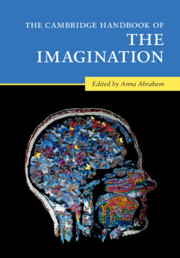Crossref Citations
This Book has been
cited by the following publications. This list is generated based on data provided by Crossref.
Wilson, Nikki-Anne
Ahmed, Rebekah M.
Piguet, Olivier
and
Irish, Muireann
2021.
Putting the Pieces Together: Mental Construction of Semantically Congruent and Incongruent Scenes in Dementia.
Brain Sciences,
Vol. 12,
Issue. 1,
p.
20.
Andrews-Hanna, Jessica R.
and
Grilli, Matthew D.
2021.
Mapping the Imaginative Mind: Charting New Paths Forward.
Current Directions in Psychological Science,
Vol. 30,
Issue. 1,
p.
82.
Liu, Lulu
Bulley, Adam
and
Irish, Muireann
2021.
Subjective Time in Dementia: A Critical Review.
Brain Sciences,
Vol. 11,
Issue. 11,
p.
1502.
Cunningham, Paul
2022.
Case for Animal Spirituality—Part 2.
Journal for the Study of Religion, Nature and Culture,
Vol. 16,
Issue. 2,
Sparks, Caitlin
Brincat, Shannon
and
Aistrope, Tim
2022.
The Imagination and International Relations.
International Studies Quarterly,
Vol. 66,
Issue. 3,
Abraham, Anna
2022.
How We Tell Apart Fiction from Reality.
The American Journal of Psychology,
Vol. 135,
Issue. 1,
p.
1.
Fanzeres, Leonardo A.
and
Nadeu, Climent
2023.
Sound-to-Imagination: An Exploratory Study on Cross-Modal Translation Using Diverse Audiovisual Data.
Applied Sciences,
Vol. 13,
Issue. 19,
p.
10833.
Glăveanu, Vlad P.
2023.
Possibility studies: A manifesto.
Possibility Studies & Society,
Vol. 1,
Issue. 1-2,
p.
3.
Hatchi, Vanessa
Guillot, Aymeric
and
Robin, Nicolas
2023.
Revisiting Motor Imagery Guidelines in a Tropical Climate: The Time-of-Day Effect.
International Journal of Environmental Research and Public Health,
Vol. 20,
Issue. 10,
p.
5855.
Flegar, Željka
2023.
Mediating Girl Power: A Cognitive Approach to Enola Holmes on Page and Screen.
Children's Literature in Education,
Vol. 54,
Issue. 4,
p.
585.
Bo O’Connor, Brendan
and
Fowler, Zoë
2023.
How Imagination and Memory Shape the Moral Mind.
Personality and Social Psychology Review,
Vol. 27,
Issue. 2,
p.
226.
Fox, Helena
2023.
The Oxford Handbook of Mental Health and Contemporary Western Aesthetics.
Timalsina, Sthaneshwar
2024.
Time and Change in Advaita—Gauḍapāda in Dialogue with Vasiṣṭha and Nāgārjuna.
Religions,
Vol. 15,
Issue. 2,
p.
167.
Pezzano, Giacomo
2024.
The Medium Is the (Discriminatory) Message: The Medial Epistemic Injustices of Philosophy.
Philosophies,
Vol. 9,
Issue. 6,
p.
169.
D'Adamo, Amar
Roel Lesur, Marte
Turmo Vidal, Laia
Dehshibi, Mohammad Mahdi
De La Prida, Daniel
Diaz-Durán, Joaquín R.
Azpicueta-Ruiz, Luis Antonio
Väljamäe, Aleksander
and
Tajadura-Jiménez, Ana
2024.
SoniWeight Shoes: Investigating Effects and Personalization of a Wearable Sound Device for Altering Body Perception and Behavior.
p.
1.
Fowler, Zoë
Palombo, Daniela J.
Madan, Christopher R.
and
O’Connor, Brendan Bo
2024.
Collaborative imagination synchronizes representations of the future and fosters social connection in the present.
Proceedings of the National Academy of Sciences,
Vol. 121,
Issue. 25,
Martínez, María-Angeles
2024.
Imagining emotions in storyworlds: physiological narrated perception and emotional mental imagery.
Frontiers in Human Neuroscience,
Vol. 18,
Issue. ,



